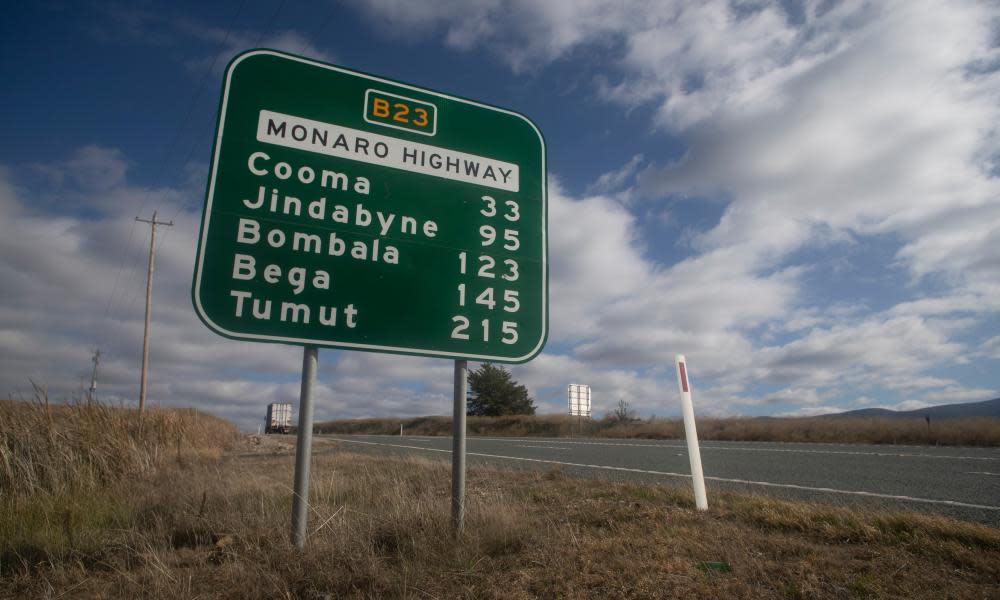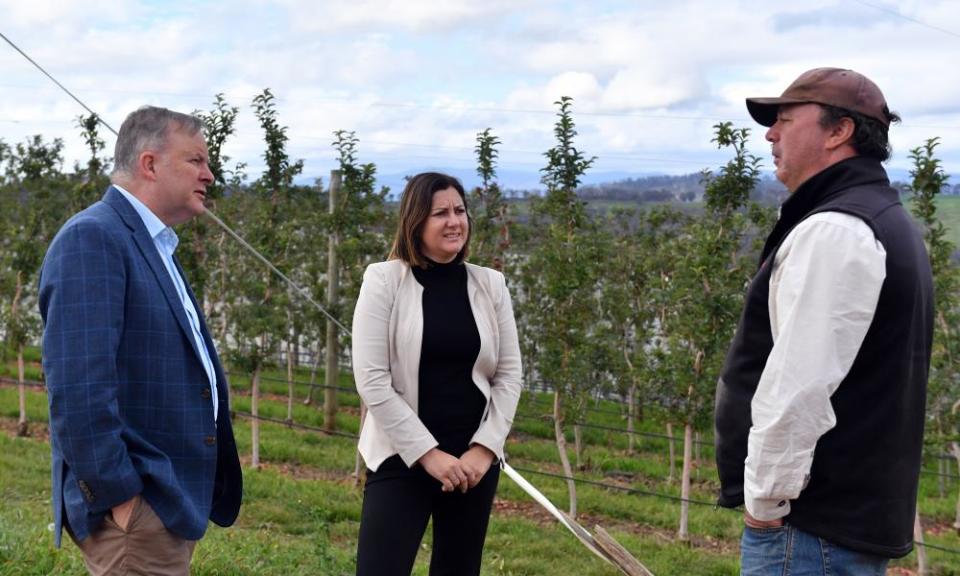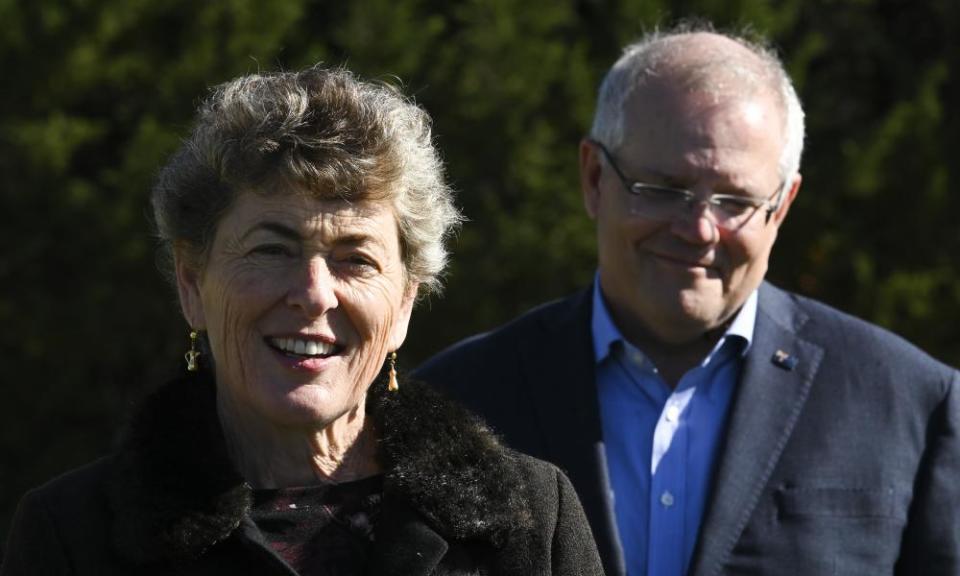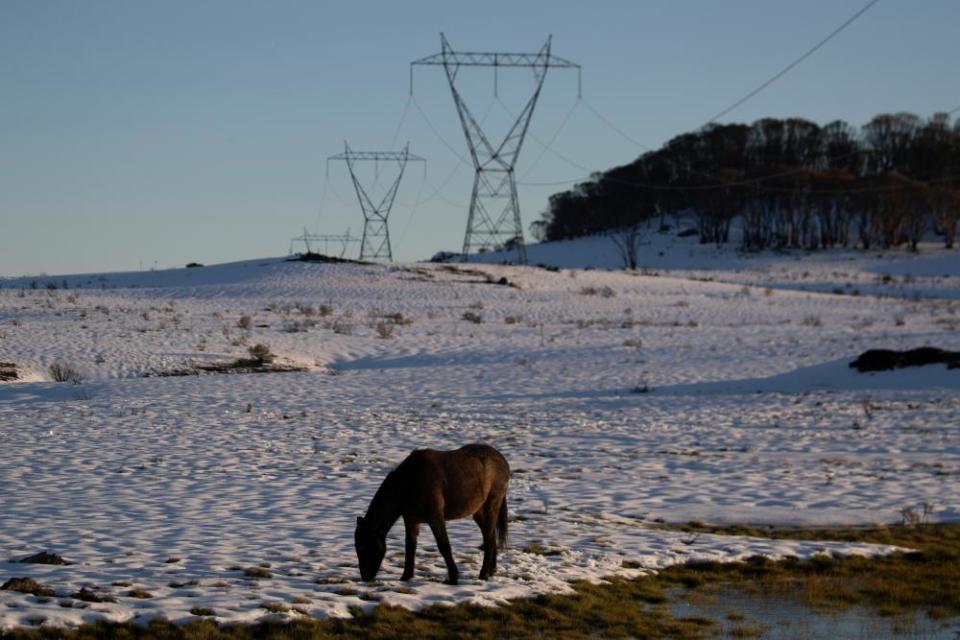Burnt fence bellwether: how Liberal and Labor both say they will save Eden-Monaro

Fiona Kotvojs’s farm was burned in the Black Summer bushfires, and she’s still waiting on money for a new fence.
“Basically the fires came through our farm on 23 January and damaged or burned a lot of the fences,” the Liberal candidate for Eden-Monaro says. “There’s a fencing grant that’s available, which we’ve applied for.
“And we fall through, my dad falls through, the gaps for the other $75,000 grant,” she says, in reference to a federal program for primary producers.
It’s an awkward anecdote for the Liberal candidate hoping to achieve what would be a once-in-a-century win for a government candidate in a byelection, when the electorate goes to the polls on 4 July. A key part of the Labor pitch is that Eden-Monaro – which covers Canberra commuter towns Yass and Queanbeyan and stretches down to Eden near the Victorian border and up to Braidwood in the Southern Tablelands – has been forgotten by the Coalition.
And it’s not the first time Kotvojs has called for help. This correspondent recalls an exchange on the sidelines of the third leaders’ debate between Scott Morrison and Bill Shorten that gave insight into the 2019 campaign.
As the leaders made their pitch to voters, Kotvojs told Mathias Cormann – one of the most senior members of the government in the crowd – how well she was performing, in the hope her party would throw more at the seat.
Eden-Monaro is the quintessential bellwether seat, but since Mike Kelly had a 3% buffer and a strong personal vote, all the attention was on the battle for neighbouring Gilmore.
“Good, good Fiona – you have them shaking in their boots,” Cormann replied.
Kotvojs – preselected again as the Liberal candidate before the byelection triggered by Kelly’s resignation – rejects this correspondent’s recollection.
default
“I think you’ve probably got the wrong person … That wasn’t me,” she says, bristling at the suggestion Eden-Monaro was overlooked.
The sense the seat was winnable was vindicated – on election night, Kotvojs pulled off a 2% swing and came within 1,685 votes of knocking off Kelly.
When NSW transport minister Andrew Constance briefly entered but then withdrew from the race to replace Kelly, Kotvojs clinched Liberal preselection on 24 May, six weeks out from polling day on 4 July.
Labor’s star recruit the Bega Valley Shire mayor, Kristy McBain, has had the inside running throughout most of May. The Nationals have selected Queanbeyan deputy mayor Trevor Hicks as their candidate; the Greens and Shooters, Farmers and Fishers have also put their hand up to contest.
“At this stage I’m not concentrating on any of the opponents in Eden-Monaro,” McBain says. “I’ve been the Labor candidate for over a month now – I’ve been out speaking to people and businesses about their concerns.
“When the other major parties eventually got around – or are still getting around to getting a candidate – we’ve actually been talking to people to understand the things they need most.”
McBain has a positive streak and her campaign pitch is to people who are “sick of politics” and don’t want their MP to “get dragged down in negativity”.
She seeks to embody the leader Anthony Albanese’s belief that voters are suffering “conflict fatigue”, so McBain stresses her ability to cooperate and work with anyone – including a Coalition government.

Labor leader Anthony Albanese and Ian Cathels, whose apple orchards outside of Batlow were affected by the bushfires. Photograph: Mick Tsikas/AAP
But McBain is seeking to represent an electorate that she says has “fallen through the cracks” – especially after it was “substantially impacted” by the Black Summer bushfires.
Kotvojs says the government has not forgotten Eden-Monaro, citing funding to remove mobile phone blackspots and the level of support after the bushfires.
Kotvojs suggests that Covid-19 may have slowed government processes, but concedes “many people are concerned” about the speed with which the $2bn set aside for bushfire relief is being spent.
“Many people tell me how fantastic it is, where they have found it straightforward – I hear both messages.”
The electorate includes the town of Cobargo, made famous for its hostile reception to Scott Morrison when the prime minister visited some of the communities hit hardest by bushfire after an ill-advised holiday to Hawaii.
There is a lot of territory to cover in Eden-Monaro, a difficulty that was influential in triggering Kelly’s retirement for health reasons.
The campaign is the first since Morrison tanked in popularity after the Black Summer fires only to bounce back just as sharply due to the Australian governments’ handling of the Covid-19 pandemic.
McBain says streamlining the bushfire recovery process and helping businesses shut down due to coronavirus “is definitely going to be a huge part of this campaign”. And despite her positive streak she doesn’t let the government off the hook for the handling of the fires.
“The warnings signs were all there, months before the bushfire season started,” she says.
“We had the former emergency services commissioner wanting to meet with the government about the impact they saw coming, [NSW Rural Fire Service] put out a prediction map in August 2019 – which was basically, almost spot on, [about] the amount of area under threat, and could potentially burn during the summer season.
“There should’ve been better preparation and planing on behalf of the federal government … There was no preparation.
There’s not going to be huge town hall debates because of social distancing, it’s going to be very different campaign
Kristy McBain
“We we’re asking for help and assistance for small business for weeks and months before it was implemented … and we were told it wasn’t in the domain of federal government – and that’s really disappointing for communities that are struggling.”
Kotvojs has a weakness among voters who join the dots between bushfires and longer, hotter summers: a long history of downplaying the human contribution to climate change.
Kotvojs, a development expert and small business owner, wants everybody to know that her farm is solar-powered and off-grid, and that she believes humans are contributing to climate change.
“I’ve always held that belief,” Kotvojs says, arguing that her “whole career” is consistent with that claim.
But does she stand by her previous statements that “solar activity” is the primary driver of climate change, that it’s a “myth” it increases cyclones and the risk to Pacific nations is overstated?
“Yes … I cannot deny the facts,” she says, citing a University of Auckland study on Tuvalu’s growing land mass.
“My background is in the environment – in the early 1990s I set up sea level monitoring stations across the Pacific.
“I’ve written environmental impact statements and been part of teams that won Australia-wide environmental awards – my approach is always evidence-based.”
Standing alongside Morrison in Murrumbateman on 24 May, Kotvojs dodged a question about whether she supports a zero-emissions target by 2050.
“Humans contribute to that changing climate and I believe that we need to have a reduction in emissions, that we need to look at approaches to be adaptive and to have our communities resilient,” she said instead.

McBain is unconvinced. “My view has been clear, it hasn’t changed from one year to the next dependent on a byelection and people should be aware perhaps my opponent’s views have changed or she’s [just] saying they’re changed.”
Other than the usual Coalition lines about reducing emissions through “technology, not taxes” – environmental policy has so far come up in Kotvojs’s online campaigning more in the context of economic development than climate change.
Kotvojs has told her Facebook followers that “red tape” and “green tape” are some of the things holding farmers and small businesses back.
Kotvojs tells Guardian Australia the native grassland laws “contradict in various areas” and that inconsistencies have “a perverse effect in relation to the native grasslands and the environment”.
Kotvojs wants to be a “strong voice in government to drive those discussions” including to call for “faster development applications” and also believes it is “incredibly complex” for employers to hire.
“Working out what award [potential employees] are under and what they should be paying … It needs to be easier to do all those things.”
Asked if she supports new coal or nuclear power stations, Kotvojs says she is “not wedded to any particular form of power production”.
“I believe in a market-driven approach – the only way to get prices down for people is to ensure that there are not subsidies, because people who can least afford it are having to pay.”
With Australia in the greatest economic contraction since the Great Depression and most supports due to expire by September – the role of government is front of mind in the campaign.
McBain argues that some industries have been left out of government assistance, and many missed out on the $1,500 fortnightly wage subsidy, jobkeeper.
In a Facebook Q&A, McBain says the jobseeker unemployment benefit cannot “snap back” to its old rate of $40 a day, which she labels “clearly inadequate”.

“I would challenge anybody to live off that. It is too low, it does prevent people getting back into the workforce and getting a job.”
But two years out from a general election, McBain puts the onus back on the government to provide “some certainty” and explain what will happen to the payments after September.
Kotvojs praises the jobkeeper program, noting it has helped employees stay in work, but toes the party line that both the wage subsidy and the coronavirus supplement on unemployment benefits were temporary.
As restrictions ease, businesses aim to get “back to being resilient and independent”, she says.
The coronavirus’ most visible impact is not on policy but the means of campaigning.
Both candidates have the difficulty of traversing the varied terrain from the Snowy Mountains down to the coast, without the usual fixtures of an election campaign along the way.
McBain is best known on the south coast but points to 10 years in Canberra, work in Queanbeyan and Yass as a lawyer, and on the Canberra Region Joint Organisation which covers all the councils in the electorate as evidence of broader exposure.
Related: Eden-Monaro byelection offers the first tantalising taste of post-pandemic politics
Kissing babies and supermarket walk-throughs have been replaced by Zoom meetings and phone banking, she says.
“There’s not going to be huge town hall debates because of social distancing, it’s going to be very different campaign.”
Kotvojs said she campaigned at shows, rodeos and shopping centres through the 2019 campaign and “this year that’s not going to be possible” due to Covid-19.
McBain’s pitch is that she is the “best possible local representative” and that – like Mike Kelly – she can “get a lot done from opposition”.
Kotvojs default solution to most problems is to call for better coordination between different levels of government, and simpler presentation of grants and recovery programs already on offer.
It helps her sympathise with those who haven’t been given what they need without criticising the NSW or federal Coalition governments. It holds out the possibility that help was there if only they knew where to look.
Kotvojs knew how to apply, and she’s still waiting on that fence. “I got an email last night in regards to the fencing grant – I need to give someone from the department a call about that. So hopefully that one will be progressing.”

 Yahoo News
Yahoo News 
